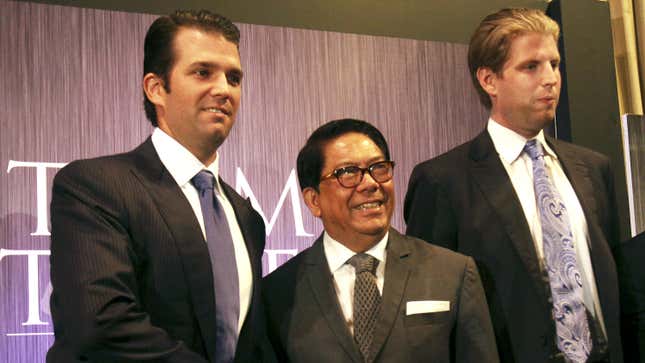You have heard of the FBI, and the DOJ—but do you know the OGE?
The US Office of Government Ethics, created in 1978 in response to scandals within the Nixon administration, has fewer than 80 employees and, normally, has a low profile role as one of the necessary, yet unglamorous, bureaucratic agencies that keep the wheels of the executive branch of the US federal government turning.
It has become a key player in the current presidential transition. While few politicians in Washington have spoken meaningfully about president-elect Donald J. Trump’s decision to retain ownership of his global business while in office, the message from OGE director Walter M. Shaub has been clear and constant: Trump needs to divest completely.
“The plan the President-elect has announced doesn’t meet the standards that the best of his nominees are meeting and that every President in the past four decades has met,” Shaub said in a speech at the Brookings Institution on Wednesday (Jan. 11), after Trump said at a press conference he would transfer management of the Trump Organization to a trust run by his sons and a longtime Trump executive, Allen Weisselberg. “We can’t risk creating the perception that government leaders would use their official positions for profit,” Shaub said.
Stepping back from his businesses is “meaningless, from a conflicts-of-interest perspective,” he said.
Trump’s decision not to sell his business as presidents going back to Jimmy Carter have done has put Shaub, a 45-year-old career civil servant and lawyer who has worked for the OGE for a decade, in a rare spotlight. On Thursday night, Jason Chaffetz, the Republican chair of the House Oversight Committee, accused Shaub of “blurring the line between public relations and official ethics guidance,” and demanded he sit for an interview with the committee.
Trump supporters accuse Shaub of playing politics by demanding Trump hew to the same ethical standards as past presidents, while Trump’s lawyers contend selling his assets would be too problematic and could result in heavy losses. But Republicans and Democrats alike who have worked with the OGE in the past are praising the agency, and Shaub, for fair dealing. Shaub was made director of the agency by US president Barack Obama in 2013.
“That is one of the least politicized agencies in the entire executive branch,” said Richard W. Painter, the former chief ethics lawyer for the George W. Bush administration, who worked with the OGE, and with Shaub. “He was very helpful with the Bush White House,” he said. Unless the Trump administration heeds the OGE’s call, he said, Trump’s conflicts will “be a pain in the backside for the next four years.”
The OGE declined to make Shaub or other officials available for an interview, citing too much work during the transition.
Why the Trumps need to sell
The Trump Organization does business in dozens of countries, where its profits are sometimes directly reliant on payments from entities linked to foreign governments, or tied directly to decisions made by foreign government officials. The company has rented apartments to Middle Eastern royalty, for example, and partnered with a businessman in the Philippines who is also part of controversial president Rodrigo Duterte’s government.

Because the Trump Organization often leases out its name and takes a percentage of ongoing profits, the arrangement in the Philippines means that Trump is, essentially, on the payroll of someone who is part of Duterte’s government. Ethics lawyers and foreign policy experts are concerned that Trump’s relationship with these foreign powers could impact US policy. Regarding the Philippines, for example, US military experts are eager to more aggressively contain China’s spread in the South China Sea, but Duterte says he is reluctant to confront China over Filipino territory China occupies, setting up an immediate conflict of interest for Trump. Trump also owes millions of dollars in debt to foreign banks, some of which have been investigated and fined by US regulators in recent years for misconduct.
His daughter and son-in-law also have businesses that present conflicts as they take roles in the incoming organization.
While Trump and his relatives have made various pledges, including Trump promising that any money from foreign governments earned by his hotels will go to the US Treasury, they fall short of what past presidents have done to distance themselves from conflicts, ethics experts say.
What the OGE does
Shaub is just one of a long line of career civil servants to lead the office, which is essentially responsible for preventing ethical lapses before they can happen in the executive branch.
Among other things, the OGE helps presidential teams get vetted and put in place as quickly as possible, in order to get the new government up and running. Becoming a top appointee in the White House, or the president, usually involves handing over a huge trove of information about financial ties, board memberships, and other possible conflicts. The OGE helps nominees and presidents figure out what to disclose, and how to untangle those ties, so they don’t run afoul of conflict of interest laws.
“The neat thing about the OGE is it is not the enforcement body, it is the organization intended to help those new political folks avoid problems,” said Max Stier, the president and CEO of Partnership for Public Service, a non-partisan non-profit that aims to make the federal government more efficient, and has been working with the OGE since before the election. (The Department of Justice is responsible for enforcing US conflict of interest laws.)
While the US president is not subject to the same conflict-of-interest laws that his Cabinet and other executive branch employees are, traditionally incoming presidents have sold assets and businesses that could create conflicts, in order to appear as transparent and ethical as possible.
The OGE also advises some 4,500 ethics officials at executive branch agencies on how to make sure their 2.7 million civilian federal employees are avoiding conflicts, focusing on, as its website says “the bedrock principle that public service is a public trust.” Done properly, the work is detailed and wonky, ethics lawyers say, and includes rules on everything from gift-giving to stock ownership.
Under Shaub, the OGE has prided itself on modernizing and being accessible, publishing videos like “Maintaining Employee Ethics Records” on its YouTube channel. Shaub’s national ethics summits feature panels on creating “An Organizational Culture of Integrity,” and other topics. The entrance fee for the first one in 2014 was $23.
“He is very thorough and very committed to doing his job well,” said Stier. “He’s a public servant who is committed to trying to make things better for the public.”
The Trump team’s unwillingness to listen to OGE advice, and the recent backlash against the agency, has surprised employees. “We’ve always prided ourselves on being non-partisan,” said one veteran OGE employee who didn’t want to be named because of the pressure the agency is under. “It is not our job to make political decisions,” he said.
Messages to the Trump transition team were not returned.
Clashing with the Trump team
In April of 2016, the OGE and the Partnership for Public Service met with US presidential candidates including Trump about preparing their cabinet nominees and themselves for financial and FBI background checks—so they could hit the ground running if they were the victor. “The goal was to introduce the campaigns to what they need to do to be able to take over the government if they were to win,” Stier said. “Our proposition was ‘Not to prepare to win was a dereliction of duty.’“
After the election, the OGE seemed to have “lost contact” with the winners, Shaub said in emails to the Trump transition team in November. After Trump tweeted on Nov. 30 he would be leaving his business “in total,” the OGE’s Twitter account responded with a series of congratulatory tweets written by Shaub that were so casual and so filled with exclamation points that some thought the agency was mocking Trump.
“I was trying to use the vernacular of the President-elect’s favorite social media platform to encourage him to divest,” Shaub explained this week at Brookings. “My thinking was that more pointed language would have been too strong at a time when he was still making up his mind.”
That encouragement has not worked. Instead, hearings were scheduled for Trump’s nominees for Cabinet positions before some had submitted preliminary information to the OGE about their conflicts and assets (although some have been rescheduled after OGE’s complaints surfaced). And the Trump family continues to refuse to sell their businesses in total, the only solution the OGE recommends.
A showdown is looming
Some predict a coming showdown between the ethics office and the Trump transition team that won’t end well for the president and his advisors.
This administration is “trying to do something very different,” said Painter, the former Bush administration lawyer. “They are trying to get people through the Senate without disclosing all their assets, or what they’re going to sell or recuse when they are in the government.” When those Trump appointees get criticized, they have been going after Shaub and the OGE in a “full-scale frontal assault on the ethics lawyers and other people who are supposed to be helping people follow the rules.” Painter said. “It’s ridiculous.”
Doing so will put Trump nominees, if not Trump himself, in jeopardy of violating criminal laws that are enforced by the DOJ’s public integrity division, Painter said. “They are career lawyers over there,” he added. Trump attorney general nominee Jeff Sessions “isn’t going to be able to tell them not to go after” anyone breaking the law.
But Shaub also is clearly worried that he won’t remain director for long. While he was appointed to a five-year position, he could be removed by Trump, a recent letter to Congress hints. “For as long as I remain director,” Shaub wrote in a Jan. 6 letter, “OGE’s staff and agency ethics officials will not succumb to pressure to cut corners and ignore conflicts of interest.”
